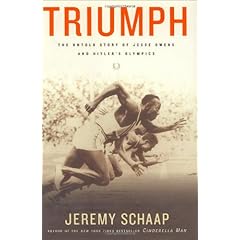
Runner's World has an excerpt from Jeremy Schaap's new Jesse Owens biography this month. MSNBC has another. Two of the most interesting reviews I can find online come from Playboy (link safe for work!) and The Jewish Daily Forward. (I also happened across two truly frightening reviews on neo-Nazi sites.)
I haven't read the whole book yet, so I'll hold off passing judgement until I do. So far, it appears that Schaap's book is one of if not the most honest Owens biographies yet. He's willing to take on several myths--and there are many.
Aside from specific events that may or may no have actually taken place, there are other issues that always get overblown. Owens is popularly idealized as "the man who outran Hitler" and who disproved Nazi racial supremacism. But in 1936, America had its own theories of white supremacism. Owens' exploits had little if any effect on either country; Germany still exterminated 6 million Jews and tried to take over the world, while blacks still got treated like dogs or worse in America. The Germans won the medal count in 1936, and US head track coach Dean Cromwell said "the Negro excels ... because he is closer to the primitive than the white man".
Even Owens' 4-medal performance was due at least in part to luck. It was a break from long-held tradition for the 100m champ to run on the relay. And Eulace Peacock owned Owens in 1935, beating him in 7 out of 10 competitions that year; it's likely that Peacock would have been Olympic champ if he hadn't fallen to injury in 1936.
Owens was really good at track--one of the best ever. He was pretty good at the 100, much better at the 200, and the second-best long jumper who ever lived. He was also a really nice guy who didn't publicly fume at the raw deals he got. He was in the right place at the right time to become idealized as a hero. And that's exactly what has happened to him.





No comments:
Post a Comment